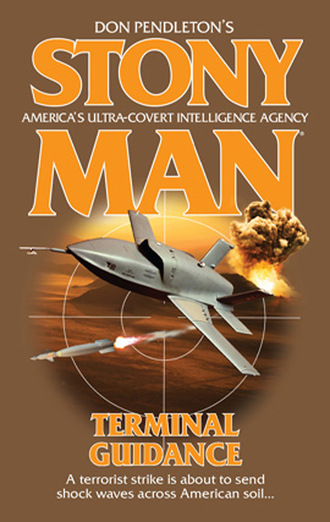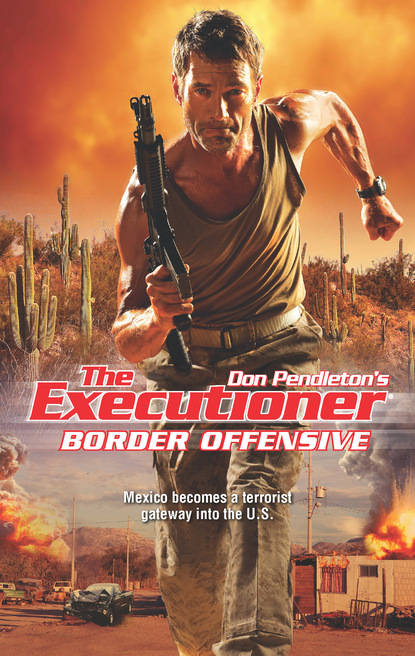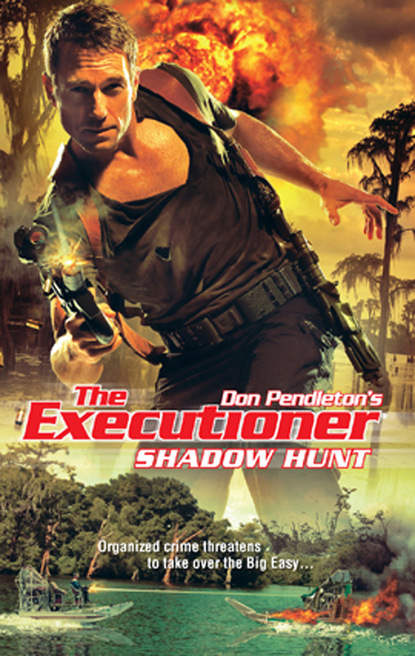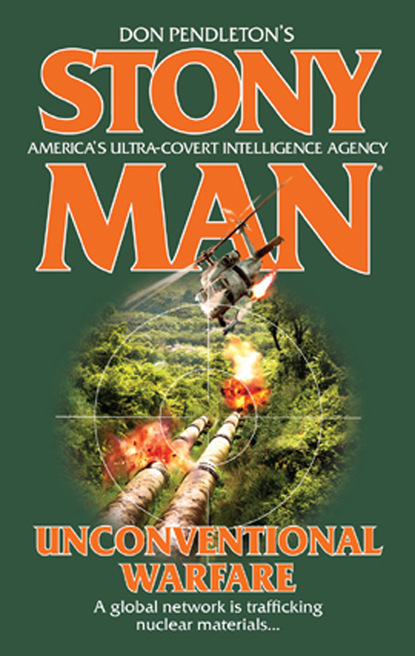
Полная версия
Terminal Guidance

“I WANT THIS HANDLED BY STONY MAN.”
“If we do have someone passing information to the enemy, I can’t hand this over to our security departments. Sensitive information could be intercepted and used against us. Stony Man is a separate entity. No allegiance to any other departments here or abroad.”
The President leaned forward, fixing Brognola with an unflinching stare.
“The main reason I want you in on this, Hal, is information I received from a genuine source.” The President didn’t elaborate on his source, so Brognola raised an eyebrow but remained silent.
“I understand your curiosity about that, but I can’t say anything right now,” the President said. “Just take my word it’s on the level. The asset has warned that the threat of the strikes is real. There will be an attempted strike on Pakistan and the U.S. mainland. Hal, it’s going to be nuclear. And we have a name. Colonel Jabir Rahman. Is that a good enough reason to bring in Stony Man?”
“Good enough, Mr. President,” the big Fed said grimly.
Terminal Guidance
Stony Man®
America’s Ultra-Covert Intelligence Agency
Don Pendleton

www.mirabooks.co.uk
CONTENTS
PROLOGUE
CHAPTER ONE
CHAPTER TWO
CHAPTER THREE
CHAPTER FOUR
CHAPTER FIVE
CHAPTER SIX
CHAPTER SEVEN
CHAPTER EIGHT
CHAPTER NINE
CHAPTER TEN
CHAPTER ELEVEN
CHAPTER TWELVE
CHAPTER THIRTEEN
CHAPTER FOURTEEN
CHAPTER FIFTEEN
CHAPTER SIXTEEN
CHAPTER SEVENTEEN
CHAPTER EIGHTEEN
CHAPTER NINETEEN
CHAPTER TWENTY
CHAPTER TWENTY-ONE
CHAPTER TWENTY-TWO
CHAPTER TWENTY-THREE
CHAPTER TWENTY-FOUR
PROLOGUE
Peshawar, Pakistan
Jay Crawford stepped aside as the rickety bus pushed through the crowded market. The interior was crammed with passengers as usual. More were perched on the roof and others clung to the exterior of the wheezing, smoke-billowing vehicle. Crawford had been in the country for almost twelve months and he still couldn’t get used to the constant congestion.
He glanced around the market area. The place teemed with people. Hundreds of them. They moved and jostled around the stalls in a colorful swirl, all seeming to be talking at once. Add to that the music coming from different locations, the cooking smells from the market traders… He never tired of it.
He turned in at the entrance of the crowded, open-fronted store that sold English-language newspapers and magazines. Crawford visited once a week to buy Newsweek and Time magazines. The man who ran the store nodded at him and produced the periodicals. He was stooped, bony, his face creased with a beaming smile as Crawford paid for his magazines.
“Good day, Mr. Crawford,” he said. “Are you well?”
“Yes, and you, Mr. Pradesh?”
“Yes. Yes.”
It was the same each time Crawford called in. Conversation seldom went beyond the polite exchange.
When Crawford stepped back outside the store’s cool interior, the solid wall of heat struck him. He checked his watch. An hour yet before he needed to make his daily report to his CIA section head in Washington. It would take him just over thirty minutes to walk back to his apartment. No rush. Crawford took out a pack of Marlborough cigarettes and lit one, enjoying the nicotine rush. He merged with the crowd and went with the flow. He had learned to go with the crush rather than try to fight against it.
He reached the edge of the market, where the street ahead was quieter by comparison with the hectic trading area.
He heard the hiss of tires on the dusty street, sensing the vehicle before he saw it. A battered old British Humber Hawk. A relic of a long-gone era. The car swayed on soft springs as it drew level with him. Crawford glanced around. He saw the passenger side rear window roll down, and had an impression of a figure inside the car a second before the ugly muzzle of an SMG appeared.
Crawford stiffened with shock as he stared into the black barrel. There was no time for anything else. The SMG crackled with autofire no more than three feet away. The long burst of gunfire delivered a half magazine of bullets that cleaved their way into his chest. The impact stunned him, his body reacting to the massive onslaught. A number of slugs tore all the way through him, bursting out through his back in ragged spurts of blood and flesh.
Crawford stepped back, briefly remaining upright before his severe injuries overwhelmed him. He crashed to the street, jerking in spasms. The muzzle of the SMG was lowered and a second burst was directed at his face and skull, tearing open his cheeks and jawline. Crawford’s head bounced back against the street, its skull cracked and bloody.
As the street crowd scattered in panic the Humber moved off, tires squealing as it disappeared around the corner, leaving a cloud of gritty dust in its wake.
Onlookers, realizing the vehicle had gone, began to move back onto the street, attracted by the sight of Crawford sprawled in a pool of his own blood, the front of his once white shirt now a sodden mess. Beside him his magazines soaked up some of the blood spreading out from his body.
AN HOUR LATER an explosion rocked the offices of New Relief, a U.S. charity set up in the city. Later examination revealed that a package delivered to the offices shortly before the blast had contained a large amount of Semtex. The explosion wrecked the building, blowing out the front wall and upper and lower floors. The detonation extended out into the crowded street, killing ten pedestrians and wounding thirty more. The thirteen workers inside the building all died. Structures on either side were badly damaged, with people inside suffering minor injuries and shock. Fires were started. By the time emergency services arrived, having to force their way through the mass of spectators, the damage was done.
News reached the American Consulate. Officials were sent to check on the victims. It soon became apparent that U.S. casualties were high. Over half the staff at New Relief were American citizens. The information was relayed back to Washington and soon reached the security community. Agency interest was generated in record time.
Jay Crawford, it turned out, was a CIA operative working covertly in Pakistan. And two of the people killed in the New Relief bombing also had CIA status.
Over the next few days three more people with Agency connections were killed. One was an American of Pakistani descent who had been working up country gathering information. Riding to work on his bicycle one morning he was targeted by a sniper, who hit him in the head with a single shot. The following day another sniper killed an American woman employed by a tourist agency. Her job was to gather information and pass it on to her handler, who also worked for the tourist company. He died the day after, when the offices were bombed. Both were also in the employ of the U.S. agency.
THERE WAS SOMETHING close to panic the day after all the details emerged—mainly because internet chatter picked up by the surveillance agencies was dropping hints that more was in the wind. Even Echelon, the information-gathering system that allowed various security agencies within the intelligence circle to collate their findings, had been picking up scraps of conversation that started to make sense when it was all brought together.
A substantial threat emerged, basic but with enough detail to raise the level of concern.
The unknown group voiced discontent over U.S. influence within Pakistan. The group declared a need to destabilize the elected regime and show that American interference would no longer be tolerated. Nuclear devices were to be detonated within Pakistan and on the American continent. Locations not specified. Date not specified. The operation was already in motion—thus the assassination of U.S. security agents working inside Pakistan.
It gave logic to the killings. Not that knowing why provided any comfort to the families of the dead. Nor did it justify the wanton slaughter of Pakistani civilians. That was par for the course. Indiscriminate death would be described as collateral damage by the perpetrators. They always cleared themselves of blame by disregarding the rights of anyone who happened to become involved by the simple fact they were in the wrong place at the wrong time. It cleared the conscience.
TWO DAYS ON and a CIA section head was gunned down on a street in Georgetown. The agent had just returned to Washington after a meeting in London with his U.K. counterpart. Said London-based agent was also snatched off the U.K. city street as he walked from his car, heading for his apartment. His mutilated body was found on the shoulder of a highway twelve hours later, after being dumped from a van.
Two weeks earlier
COLONEL JABIR RAHMAN WAS addressing his men.
“The detonation of a dirty bomb will have two major effects. First, the release of radioactive elements that will cause contamination,” he said. “The spread will not be as great as a conventional nuclear explosion, but it will kill people and contaminate the area. The second effect may have the greater potential. How is the American public going to react when this device explodes and all efforts of the U.S. administration to halt it prove useless? I will tell you, my brothers. There will be hysteria. Panic. Americans are still recovering from 9/11. Confidence will be shattered. The public trust will be lost. Wall Street will slump.”
Rahman smiled. “People will be withdrawing their savings and heading for the Midwest. Searching for safety. If Boston is not safe, what about New York? Los Angeles? Washington? And in reality there is no Jack Bauer to save them from the evil Islamic terror.”
“Psychological terror?” one man interjected.
“Terror in the mind can often be more lethal than a bullet.”
“And what about our own territory?” someone else asked. “The detonation in Pakistan? “
“In essence the same. We explode the device near the secret American base the Pakistani president has allowed on our soil. He has been coerced into letting the Infidels bring their rancid presence to our land. This destruction of their base will make them realize they cannot be allowed to bring their poison here. A painful, sacrificial lesson, but it will show that Pakistan must shake off the chains that bind it to the U.S. That our own government is so weak because it allowed itself to be seduced by the Americans’ false promises. They cajoled our president into believing that if he allied himself to the Infidels he would make Pakistan stronger. Able to stand against the so-called evil trying to subjugate us. In truth it has been America wanting to enslave us. Flaunting its power. Demanding we bend our will to it. The bombs will show the inherent weakness that exists. That both America and Pakistan are vulnerable.”
“But many of our own people may die. There will be contamination….”
“To a far lesser degree. The device we detonate here will be a third the power of the bomb in America. Not as many of the rods will be used, just enough to destroy the American military here. Civilian deaths will be less, and the lingering radiation will fade at a far quicker rate. An area will be isolated after the blast, true, but the memory of the day will stay with the people, and once the president has been exposed as weak and ineffectual, our control and strength will grow rapidly. This one act will propel us into a favorable position with the public.”
“Colonel, do you believe we can achieve all this?” a man asked.
“If I was not one hundred percent certain, then I would abandon everything. But I know we can do it. And achieve greatness for our beliefs. Our cause. By inflicting harm on America this way we will take a great step forward. My friends, brothers, a victory against the Great Satan must be worth the risk.”
Umer Qazi watched the faces and listened to the murmurs of the assembly. He allowed himself a thin smile. He moved closer to Rahman.
“I believe you have them on your side, Colonel. Completely.”
“Did you doubt me, Umer?”
“Never for a moment. I was simply waiting for them to realize the truth in your words.”
“Words are your great skill,” Rahman said. “You use them well.”
“Are you telling me something?”
Rahman nodded in acknowledgment, at the same time raising a hand in salute to the assembly.
“I believe it is timely for you to make a trip to London. So you can use your honeyed words to bring young Anwar Fazeel fully into the circle.” Rahman glanced at his companion. “You have told me he is ready.”
“Assuredly so. Should I make travel arrangements?”
“Already taken care of,” Rahman said. “You leave tonight.”
London
BORN IN THE U.K. of Pakistani parents, Anwar Fazeel felt his religion was important to him. Very important. Although legally British, he did not enjoy his life in the U.K. He considered himself an outsider.
The highly intelligent twenty-four-year-old was a computer programmer at a local company. Known to be a hard worker, with an innovative mind and impressive IT skills, he had few friends outside work and not many within his place of employment. He shunned contact with those he considered the tainted inhabitants of the country, and immersed himself in radical groups that were forming in and around his hometown.
His parents and two brothers lost touch with the young man as he edged away from them, preferring to be in the company of true believers. Fazeel felt his family had become too Westernized in their thinking and their daily lives. His father was a successful businessman who owned two restaurants and a number of shops. He belonged to a golf club and had many non-Pakistani friends. All this pushed Fazeel closer to the dissatisfied crowd, who met regularly at the local mosque for political and religious discussions, berating the country and condemning the culture that surrounded them.
One of the regulars at the gatherings was Umer Qazi, a quiet, studious man who looked like a university professor with his conservative dress and manner. Sometimes he was simply there, watching and listening, his presence unobtrusive. But he did more than just observe. He took note of those young men who stood out from the crowd. The ones who exhibited more than simple group fervor. It was his task to pick out the men with real passion. With fire in their bellies.
The ones who were sincere in their beliefs.
Who would stand up to be counted when the time came.
One of those was Anwar Fazeel.
Qazi saw the potential. Realized that Fazeel, with his background in IT, was someone worth cultivating.
Umer Qazi was a recruiter, strategically placed among the dissenters to seek out ones who might prove useful. Qazi represented the cause masterminded by Colonel Jabir Rahman. He had been sent to the U.K., where many young men had been drawn into the fold. They were the easiest to recruit, with their impressionable minds, and the isolation many of them felt meant persuasion was often relatively simple. Promises of a welcome by brothers in arms, the glories of martyrdom and the delights of the afterlife were often all that was needed to draw them in. Qazi was a master of his craft. His subdued manner, his educated personality and his gentle coaxing were powerful weapons at his disposal.
When he employed them all on Anwar Fazeel, he hooked the young man quickly. He began to see him one-on-one, choosing quiet cafés where they could sit and talk for long periods. Later, as Fazeel allowed himself to be seduced by radical thinking, Qazi introduced him to other individuals who, working to plan, made Fazeel believe he was special. That his way forward was with the group. With Rahman, who wanted to steer Pakistan onto a better path, away from the influence of those who were allowing the country to become little more than an American pawn.
An arranged meeting where Fazeel was brought face-to-face, via video link, with Colonel Rahman himself was the final push that propelled the young man to the forefront of the upcoming campaign. The encounter took place in the home of a close friend of the colonel. Once the connection was made, Rahman and Fazeel were left alone. Slightly overawed by being in the great one’s presence, albeit via satellite, Fazeel felt awkward as he sat in his chair. Rahman, noticing his nervousness, spoke to him with encouragement.
“Anwar Fazeel, this is a great day for me. I am honored to be meeting you, a young man who will be instrumental in orchestrating the great crusade against our enemies. Without your skill and knowledge our plan would not come together, but with your help we will achieve our victory.”
Fazeel stared into the benevolent face of the man he worshipped.
Jabir Rahman.
The leader of the cause.
“No, sir, it is I who consider myself honored. Through you I will be able to contribute my part. Whatever you need from me, just ask.”
“Soon you will start on a journey that will bring you to Pakistan,” Rahman replied. “Have you ever been here?”
“Once, to visit with my father’s family.”
“Then you have stepped on our soil and breathed in the air of our spiritual home. This time, Anwar Fazeel, you will go on a special journey. You must prepare yourself for this. Pray for guidance. For strength. There may be a need for sacrifice. You will have to sever all contact with your family, here and there. Can you do that?”
“My relatives have given themselves over to the non-believers. They have abandoned Islam for the ways of the West, so are no longer my family.”
“Good,” Rahman said. “Now, listen to me, Anwar. Tomorrow is the start of the weekend. Qazi will take you to see what you will be working with. You must familiarize yourself with all the data. Learn everything about it. But there must be no talking about it outside of the group. You understand?”
“Of course, sir.”
“If anything leaks out, then our plan will be compromised. I cannot stress how important it is that nothing—nothing—gets out.”
“When will I leave for Pakistan?”
“Very soon—a pleasant flight that will allow you study time. When you arrive, I want you to fully understand the equipment, so that when we deploy there will be no hesitation.”
“It will be done, sir.”
“Qazi chose well. You are to be an important part of our plan. I have every faith in you, Anwar Fazeel. We may not see each other again until you reach Pakistan. Until then, may Allah smile upon you.”
When the conversation ended, Fazeel was joined by Qazi again.
“He is well pleased with you.” Qazi handed over a folded paper. “Can you be here at eight in the morning?”
“Of course.”
“Tell no one where you are going. No one.”
QAZI PICKED FAZEEL UP at the rendezvous spot, then pulled the silver SUV into the traffic and drove on. Fazeel knew nothing about this part of the city, but Qazi negotiated the streets with ease. Eventually they arrived at an area sign-posted Tilbury, which Fazeel vaguely knew was a seaport and container base. He spotted cranes and warehouses edging the river, truck depots and sprawling storage yards.
Qazi eventually stopped at a pair of manned gates, leaning out to speak to a security guard and show him a pass. The gates opened and Qazi drove to the dock, which had a number of seagoing freighters moored alongside. Being a weekend, there were few people about.
Again Qazi seemed to know exactly where he was going. He rolled along the line of warehouses and stopped outside one that bore the name Saeeda Hussein Import-Export.
The warehouse was large. The main doors were closed, but Qazi took Fazeel to a side door, tapped in a code at the small panel and led him inside. The interior was full of crates, and racks holding smaller items. Their footsteps echoed on the concrete floor as they approached a row of offices along the far wall.
“Good to see you, brothers,” Qazi said to the two men occupying the first office.
They returned the greeting, then turned their attention to Fazeel. “Is this the one chosen?”
“Indeed. This is Anwar Fazeel. Anwar, this is Ahmad and Shiran. They will guard and protect you. When you leave for Pakistan, they will go with you.”
Fazeel inclined his head. “I am happy to meet you, brothers.”
Ahmad laughed as he noticed the way Fazeel was looking around the office. “He is so eager to see his new toy. Come, Anwar, let us introduce you.”
He was ushered through a connecting door into a larger office, where only the soft hum of an air conditioner broke the silence. In the center of the floor stood a large piece of equipment partly covered by a dust sheet. When Shiran slid off the sheet, Fazeel’s electronic unit was revealed.
The other three stood back, smiling, as he examined it, first walking around it, then focusing his attention on the detail of the control console. He was familiar with the keyboards and monitors. Though some of the other components were new to him, his keen intellect absorbed the layout, quickly assimilating the schematics.
“Can you understand it all?” Qazi asked.
“I will learn. It will not be difficult.”
“I think he’s fallen in love,” Shiran said.
“Will it do what we require?” Qazi pressed.
“I would be able to give you a better answer if I knew exactly what it was for.”
“A mystery to be revealed,” Qazi said. “Come.”
They took him to the far end of the warehouse, where a plastic-sheeted section had been constructed. The closest panel was pulled aside and they all stepped through.
Fazeel got his first look at the Barracuda.
It had a sleek aerodynamic configuration. A slim fuselage, with a generous wingspan. The engine was mounted at the rear, encased in a smooth pod of metal. Fazeel noticed immediately there was no facility for a pilot. No cockpit. A number of antennae and probes extruded from the smooth, silver-gray finish. It stood on a fixed, slender undercarriage and wheels.
“A UAV,” Qazi explained. “An unmanned aerial vehicle. Also called drones.”
“A robotic aircraft,” Fazeel said. “They can be programmed via a control center.”
“Like the one you have just seen,” Ahmad said.
“And with this machine we will bring about the colonel’s plan?”
“I believe the colonel prefers to call it his operation,” Qazi said. “He is very precise about these things.”
“Where did you get this thing?” Fazeel asked.
“We acquired it,” Qazi said. “For now that is all you need to know. What you must do is study all the manuals that came with the machine. Learn to master the complexities of the control module, because, brother, one day you will sit at that console and make the drone do what we want.”
Fazeel was presented with thick printed manuals and a set of DVD discs.
“Tomorrow the drone will be disassembled and packed into protective crates for the journey to Pakistan,” Qazi said. “The control module will also be packed. You will not see it again until you arrive in the country yourself. Between now and the end of your journey you will have learned everything needed to make the drone fly to the targets we designate. Fazeel, you have been chosen because your computer skills are excellent. You understand, and you have the intellect to make the Barracuda do whatever you want.”
“I won’t let you down, brother,” he said. “Or the colonel.”












